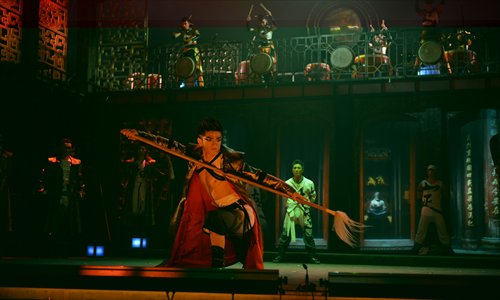Balancing Act
By Liao Danlin Source:Global Times Published: 2013-12-17 17:03:01

Promotional photo for Immortal Chi Photo: Courtesy of CAEG
Chinese stage productions have proven difficult to export abroad, as most international theatergoers have little knowledge of Chinese culture, history and art.Multimedia extravaganza Immortal Chi: The Ultimate Quest for Balance, however, appeals to one of China's most time honored exports, martial arts, in an attempt to connect with both domestic and international audiences.
Produced by China Arts and Entertainment Group (CAEG), Immortal Chi premiered over the weekend in Beijing, and will hit Shanghai on December 24 and 25.
But according to the show's production team, striking a new balance between East and West has proved more difficult than adding some special effects and a few flying kicks.
East-West fusion
Immortal Chi is the third joint-production between CAEG and Canadian director Erick Villeneue. The first of which, Era - Intersection of Time in 2005, saw 400 performances in Shanghai every year since its debut and continues to draw large audiences.
"Box-office earnings surpassed the 400 million yuan ($65.88 million) mark long ago. We plan to make this a decade-long performance," Zhu Ziyi, deputy general manager of CAEG told the Global Times.
Later, CAEG and the Canadian team also produced the acrobatic show Kaleido, which saw a one-year run in Shanghai.
Immortal Chi, however, was produced with the intention to tour the world, and stage designs are relatively simple and mobile compared to Era -Intersection of Time.
The play tells a story of Tai Chi master Ma Qi, who while training loses his balance and falls to the ground, triggering a stream-of-consciousness tale of how he came to learn martial arts and achieved balance of mind. Ma's wild imagination also allows for creative fusion of style, such as traditional Chinese dance mixed with kung fu and break dancing.
The show places less emphasis on storyline and focuses on action, stage design and interactive segments.
Zhu explains the director worked closely with the cast to help them with the necessary movements and positions essential to Chinese martial arts.
The actors, in turn, invite audience members on stage to demonstrate the basics of kung fu.
Blurred plot lines
Immortal Chi aims to create both an entertaining and modern show. According to Zhu, it is a common format for big productions to have a rough plot and maintain an open story line.
"This way the audience can interpret it in different ways," said Zhu.
However, this approach can also have its consequences. Several audience members at the Beijing performance last Friday complained about the story line. One surnamed Xu told the Global Times that he had a hard time grasping the plot.
"I'm still not sure who the main character was," said Xu outside the Century Theatre on December 13, adding "I felt the audience interaction was a bit abrupt, and it doesn't fit with the rest of the performance."
Xu explained the concept behind the performance is too abstract, even for Chinese audiences who have a background in Chinese philosophy.
Finding the right story to attract international audiences has always been a challenge for Chinese producers. Many have chosen to interpret Western classics by Shakespeare or Bertolt Brecht with Chinese elements.
But according to Villeneue, Tai Chi is to use and control one's body and mind, with an emphasis on balance and fighting with a fluid, soft power. The main character is a master that knows many different styles of kung fu and Tai Chi, so his life experience is a story in itself.
Market driven
Although domestic productions combining Chinese and Western elements have seen a spike in popularity in recent years, attracting international audiences remains an unsolved problem for producers.
Zhu told the Global Times that many Chinese shows touring in Europe or the US purposely don't include an intermission as to prevent the audience from leaving before the second half.
"The first 10 minutes they love it. The costumes, stage design and performance are all very fresh. But everything gets boring after that," explained Zhu.
"Peking opera, for example, sometimes makes the audience fall asleep. They probably would just leave after the first act," he added.
Zhu also feels that producers should consider their target markets rather than personal preferences.
"There are so many failed examples… We didn't produce a show about kung fu and Tai Chi simply because we like them. These choices are based in research, experience and understanding of the market," he explained.
"The most difficult part in the whole process is satisfying audiences. No matter how hard you try, unpopular shows won't survive. Only time can tell if this will be a success," said Zhu.
Posted in: Diversions, Theater